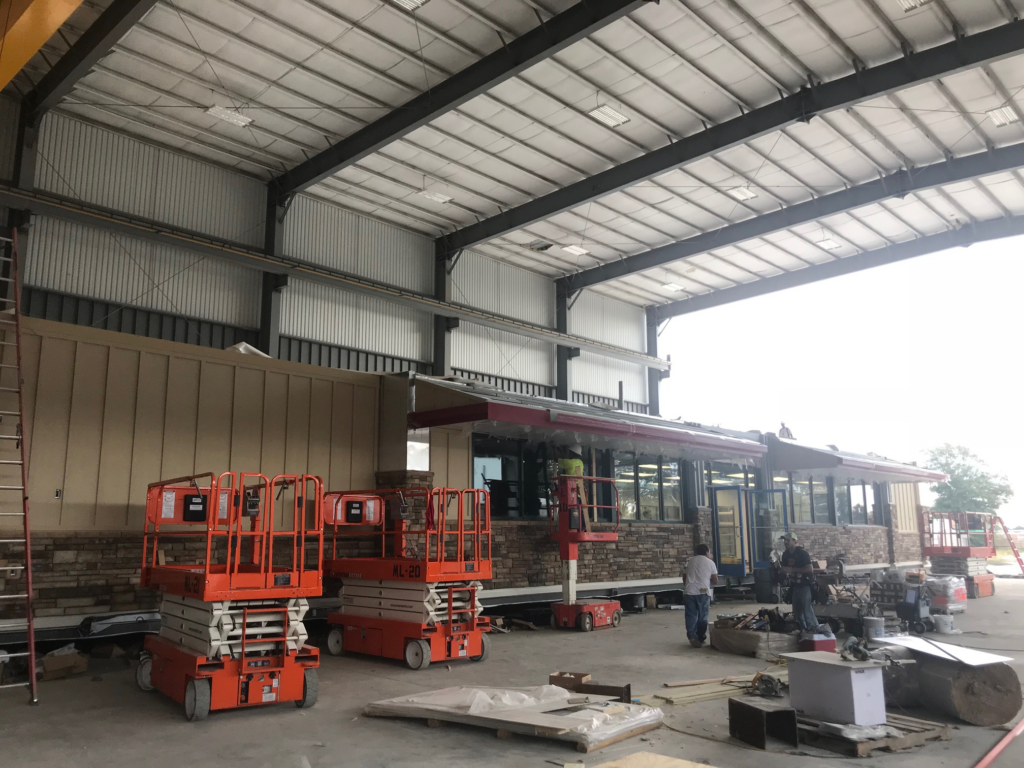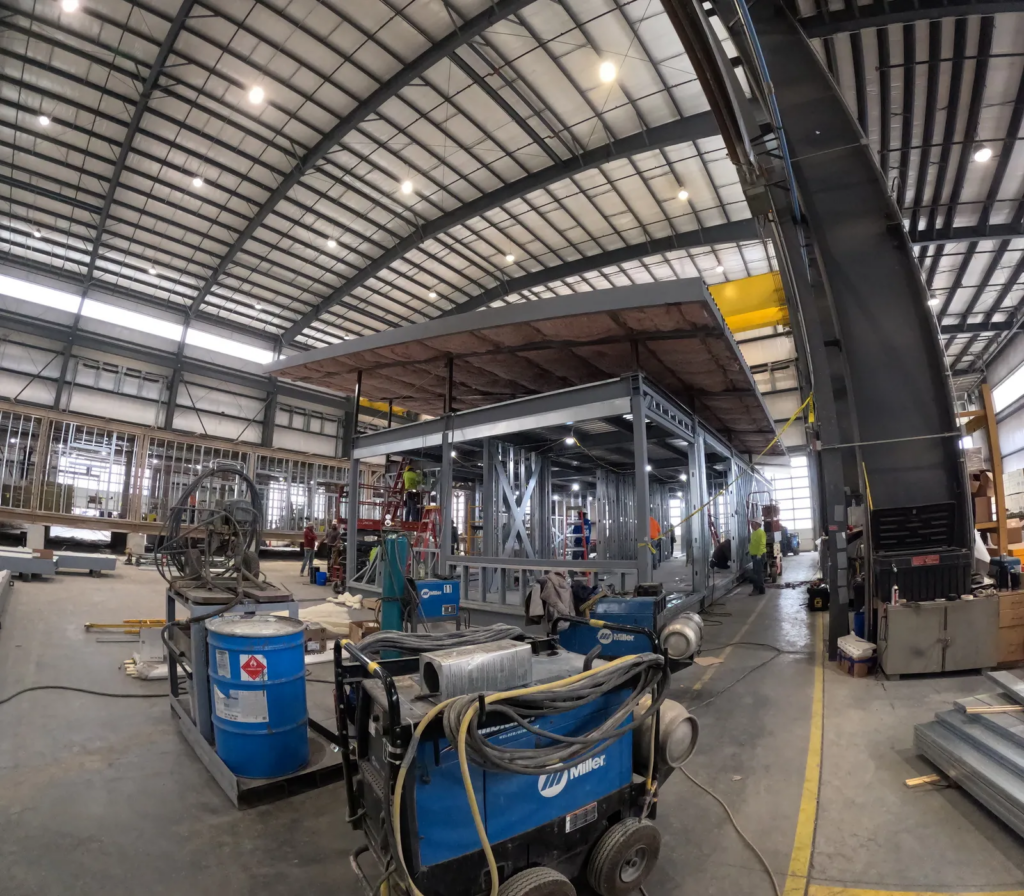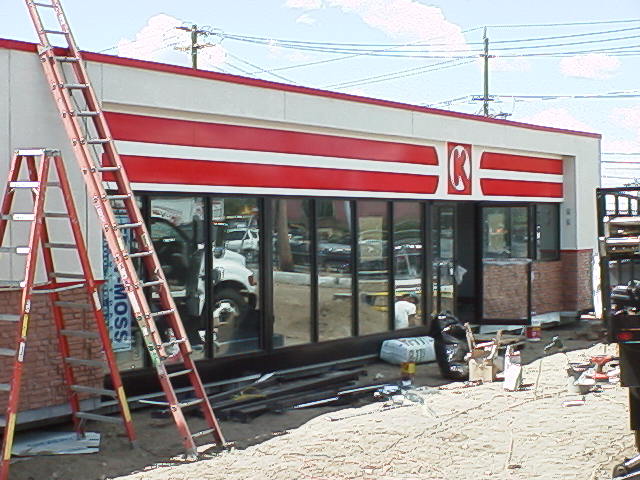The convenience store industry is undergoing a quiet revolution—not in what’s on the shelves, but in how the stores themselves are being built. Wawa, one of the most recognizable convenience store brands in the U.S., is leading the charge by adopting modular construction for its new locations. This shift isn’t just about cutting costs; it’s about redefining how quickly, efficiently, and sustainably convenience stores can expand.

Top 4 photos – Frey-Moss Structures
With consumer demand for accessible, well-stocked, and modern convenience stores growing, major chains are beginning to rethink traditional construction methods. Modular construction, once reserved for hotels, fast-food restaurants, and housing developments, is now making its way into the retail space. Could this be the future of convenience store development?
Why Convenience Store Chains Are Choosing Modular Construction
Traditional convenience store construction follows a slow, site-built process that can take months, sometimes even longer, due to weather delays, labor shortages, and supply chain issues. By shifting store assembly to modular factories, retailers can streamline their expansion strategies while reducing costs and construction time.

.
Faster Construction, Faster Openings
Modular construction allows for much of the store to be built offsite in a controlled factory environment, where weather delays, material shortages, and on-site complications are minimized. Once fabricated, the modules are transported to the store site, where they are assembled in a fraction of the time it would take for a traditional build.
For Wawa, this means a new store can be completed in weeks instead of months, allowing them to expand more aggressively in high-demand markets. In today’s competitive retail landscape, speed is money.

.
Cost Savings & Efficiency
Building in a controlled factory environment reduces material waste and optimizes labor, cutting overall costs. With traditional construction, labor costs are unpredictable, and material costs fluctuate due to inefficiencies. In contrast, modular construction provides:
- Consistent pricing by pre-purchasing materials in bulk.
- Lower labor costs by reducing the number of workers needed on-site.
- Reduced permitting and inspection delays, as much of the process happens in a factory where quality control is stricter.
Minimal Disruption to Local Communities
Traditional construction sites can be disruptive, bringing months of noise, dust, and traffic delays. Because modular stores arrive at their locations partially or fully built, on-site assembly happens in days instead of months, minimizing the impact on the surrounding community.
For convenience store chains, this means they can open stores in more locations without pushback from local residents and municipalities frustrated by prolonged construction.
Scalability for Rapid Expansion
The biggest advantage modular construction offers convenience store chains is scalability. Wawa’s adoption of modular construction isn’t just about trying something new—it’s a strategy for rapid expansion. By using modular methods, they can roll out stores at an accelerated pace without straining local contractors or supply chains.
Other industries have already proven that modular scalability works. Fast-food chains like McDonald’s and Starbucks have used modular construction for years, rolling out new locations with factory-built components to maintain consistency and speed. Convenience stores are now catching up.
The Wawa Case Study: Modular Construction in Action

.
Wawa, known for its cult-like customer following and high-quality prepared foods, is now testing modular construction for its stores in Virginia and North Carolina. These locations will serve as proof-of-concept sites, testing how well modular-built stores perform compared to traditionally built ones.

2 photos – Wawa Convenience Stores
How It Works:
- Factory Fabrication – The store’s modules are built in a factory, including electrical, plumbing, and interior fixtures.
- Transport to Site – The pre-assembled units are delivered to the site.
- Rapid Assembly – Construction crews assemble the modules, connect utilities, and complete finishing touches.
- Doors Open – The store is operational in a matter of weeks.
By piloting this approach, Wawa is setting a new precedent for how convenience stores might be built in the future. If successful, their modular rollout could pave the way for other major chains to follow suit.
Will Other Convenience Store Chains Follow?
Could 7-Eleven, Circle K, and Sheetz Be Next?
As Wawa tests modular construction, other convenience store brands are watching closely. Chains like 7-Eleven, Circle K, and Sheetz have aggressive expansion goals and could benefit from faster, more cost-effective builds.
Challenges to Adoption
Despite its advantages, modular construction isn’t without hurdles. Some factors that could slow industry-wide adoption include:
- Customization Limitations – Chains may be hesitant if modular designs don’t offer the flexibility they need for store layouts.
- Initial Investment Costs – While modular construction saves money in the long run, the upfront factory investment can be significant.
- Perception Issues – Some brands may still view modular as inferior to traditional construction, despite its increasing popularity in other sectors.
That said, the cost benefits, efficiency, and sustainability of modular construction may eventually outweigh these concerns, pushing more brands toward factory-built stores in the coming years.
The Future of Modular Convenience Stores
As Wawa’s modular experiment unfolds, the convenience store industry is on the brink of a construction revolution. If modular methods prove successful, we could see a shift toward fully prefabricated convenience stores, travel plazas, and even hybrid grocery-convenience models.
Imagine a future where:
- Stores are built and stocked in factories, then shipped to locations fully operational.
- High-volume urban locations use modular pop-up stores to serve customers faster.
- Gas station convenience stores and travel centers roll out nationwide without traditional construction bottlenecks.
With consumer habits evolving and retail competition intensifying, the demand for faster, smarter, and more cost-effective construction methods will only grow. Wawa is just the first major brand to make the leap—but it certainly won’t be the last.
Are modular factories the future of convenience store construction? All signs point to yes.
Personal Perspective: A Family Legacy in Convenience Stores
My connection to the convenience store industry runs deep. In 1960, my father opened a small store in Bellefonte, PA, inspired by the newly emerging 7-Eleven convenience store model. At the time, the idea of a store that stayed open late and carried a wide variety of everyday essentials was still a novelty. Over the next two decades, we expanded our business into a chain of 17 stores across central Pennsylvania, refining our operations, adapting to changing consumer needs, and watching the industry evolve in real-time.

During that time, another local convenience store chain, Sheetz, located 30 miles away in Altoona, started and steadily grew to become an industry leader, redefining what a convenience store could be with its food service innovations. Our stores thrived, but as competition intensified, we ultimately sold our chain to a larger, expanding competitor. While that chapter of my life closed, it gave me an insider’s view of how convenience stores operate, grow, and adapt to market shifts—a perspective that has stayed with me as I transitioned into the construction industry. Today, as modular construction transforms the way convenience stores are built, I can’t help but recognize the same kind of industry disruption and innovation that shaped my early career.
My Final Thoughts:
As more brands look to expand efficiently, modular construction will likely become the go-to method for building convenience stores. While Wawa is leading the way, it’s only a matter of time before other brands follow suit, changing the way we think about retail construction forever.
Will we see a future where most convenience stores are built in factories? The answer might be closer than we think.
Gary Fleisher, The Modcoach, writes about the modular and offsite construction industry at Modular Home Source.
.
CLICK HERE to read the latest edition
Contact Gary Fleisher












